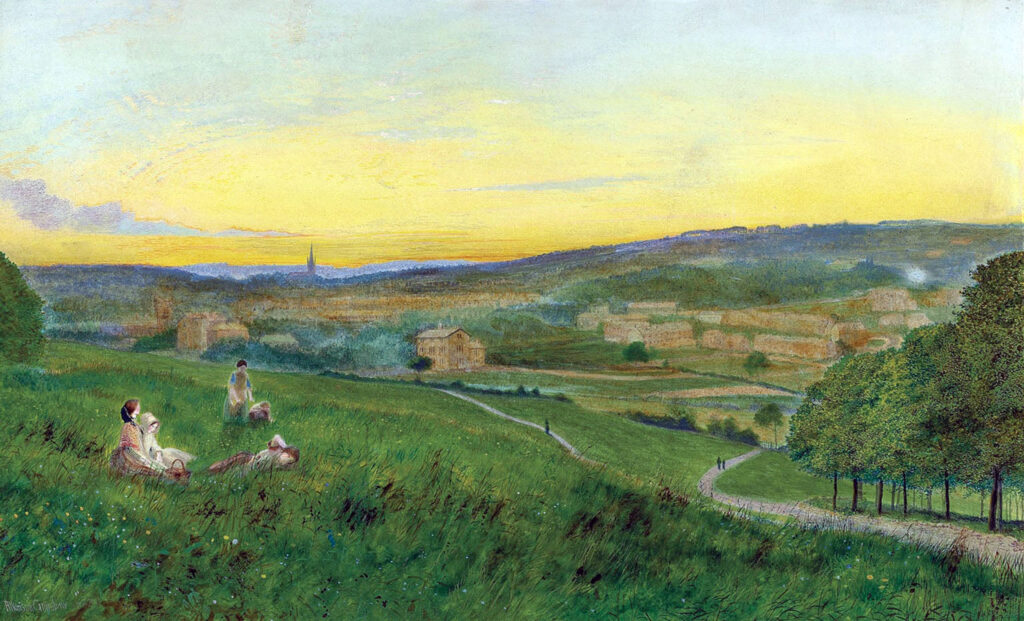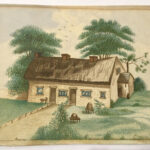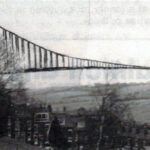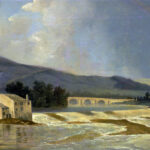30 May 1835: Alfred Austin, future poet laureate, “Banjo-Byron that twangs the strum-strum,” is born into rural splendour at Ashwood, 48 Headingley Lane, Leeds

Heading north, the teenage Austin would also have witnessed the early urbanisation of (Far) Headingley, portrayed here a few years later by John Atkinson Grimshaw, and including (L to R) Grimshaw’s brunette wife Theodosia, as well as – and here I follow David Hill – Moorfield House (Alma Rd), Wheatfield Lodge/House (Wheatfields Hospice at Alma Rd/Grove Rd), the tower of St Chad’s Church (1868), Ashfield House (Grove Rd), etc etc. David suggests that JAG’s viewpoint is at the western end of Ridge Terrace, but I think he’s at a spot roughly in what is now North Hill Well Wood, next to the Grange Court apartments, at Batty’s Wood on Woodhouse Ridge; that the left-hand path is now Ridge Terrace, and the right-hand path that which from the Cumberland Rd ginnel cuts across Cardboard Hill aka the Hill of Death (tho why the kink in it?) and then goes along the backs of the houses on Balbec Ave as the Dales Way Link; and that the hedgerow connecting the two paths is Oil Mills Lane (Wood Lane) – see this overlay (Grimshaw 1868).
Alfred Austin. 1911. The Autobiography of Alfred Austin, Poet Laureate, 1835-1910, Vol. 1/2. London: Macmillan and Co. Some enjoyable local colour – mostly outside Yorkshire. Get it:
.Unedited excerpt
If an excerpt is used in the book, it will be shorter, edited and, where applicable, translated.
I was born on the 30th of May 1835 at Headingley, then an outlying rural parish in the neighbourhood of Leeds, itself more like a very quiet provincial town than what it has since become under the manufacturing expansion of the last sixty years. My home, built by my Father shortly after his marriage, was thoroughly in the country; no other house intervening between it and the farther side of Woodhouse Moor. One small cluster of lowly buildings could alone be seen on the Moor, which I have heard my Father say he remembered as having been the Kennels for the local Hunt. No tall chimney, no volumes of smoke, could be seen from our grounds, nothing to indicate the proximity of un-picturesque mills and furnaces. Adjoining meadows, the playground of my brothers, my sisters, and myself, widened our boundaries, that are now occupied by rows of suburban terraces and a church, or chapel, I am not certain which. But a regiment of Cavalry and a Battery of Artillery were then always stationed in Leeds; and it was on Woodhouse Moor that they executed, three or four times a week, their somewhat elementary manoeuvres. The glitter of the cavalry sabres or the sound of the first cannon-shot always aroused my interest; and I watched from the lawn with childish excitement the charging of the horses and the firing of the guns. I little thought that one of the experiences of my life would be to witness in 1870-71 at close quarters for six consecutive months the greatest and most pregnant European War of the last ninety years. When, at six years of age, my importance was materially advanced by the ownership of a pony, I used to hasten to Woodhouse Moor as soon as ever I saw the diminutive military force, which then seemed to me so imposing, had arrived there; and I remember, on one occasion, that self-same childish dignity being put to shame by my losing my seat in the presence of what I regarded as the British Army, and by which I was promptly replaced in the saddle. It so happened that Prince George, afterwards Duke of Cambridge, was the officer in command of the garrison; and, with the kindness of his race, he made me ride by his side during the rest of the morning.
Comment
Comment
Austin’s parents were married in 1829 in Barnsley, so Ashwood was built in the early 1830s. It is listed, and Historic England has some fine photos by Martin Pitt. Austin’s father died in the winter of 1857, the same year in which Austin was called to the London Bar, and it sounds like his mother and sister moved from Ashwood to Adel in 1858. Then, presumably, Ashwood Villas and Hilton Court were built on parts of the garden. Ashwood makes far more sense without them. Headingley Hill Congregational Church was designed by Cuthbert Brodrick, architect of Leeds Town Hall, and built in the mid-1860s.

The first home of Alfred Austin: Ashwood, 48 Headingley Lane, Leeds, viewed from the forecourt of Hilton Court (Cobb 2018/01/26)
Eveleigh Bradford and Jane Bower have published profiles of Austin. A cosmopolitan Catholic Tory patriot, he clearly preferred Italy to his birthplace, which he doesn’t seem to have versified, and where the Leeds Civic Trust has demonstrated what some regard as embarrassing smallness of mind in denying him a blue plaque. However, there’s a lot to be said for this contemporary view:
Mr. Alfred Austin is another poet who takes himself very seriously, in six or seven volumes of verse (it does not matter counting precisely, for they are all very much alike), admirably printed, with Pegasus on the cover, and everything proper. Mr. Austin writes for the most part in smooth and polished metre, and he does not make any ostentatious attempt to mimic the style of greater poets, except in the portentous array of eight hundred and eighty-six stanzas, under the title ‘The Human Tragedy’ (why this particular story should be the human tragedy par excellence, Heaven only knows!), which was probably what provoked Browning’s reference to the author as
Banjo-Byron, that twangs the strum-strum there.
On the other hand, Mr. Austin is absolutely without ‘style’ of his own. He has never achieved style, never risen to it; and his volumes, considering that they are mostly fairly written verse and not without pleasing ideas of a simple and obvious kind, are the most absolutely colourless poetry, to have any pretence to be called poetry at all, that we have ever turned over. The matter is made worse by the author’s utter deficiency in the sense of humour – a deficiency which he shares with some great poets (Wordsworth, for example), but which is a peculiarly dangerous defect for a ‘minor poet.’ A sense of humour would have saved him at all events from such extraordinary bathos, for instance, as when the hero of ‘the human tragedy’ encounters his faithless fiancée:
The shop whence they that moment had emerged
Plainly bespoke their errand up to town (!!)and would have saved him from making himself a laughing-stock in the conclusion of his poem ‘At Delphi,’ where he professes to have hesitated about crowning his head with the indigenous laurel, lest he should court the fate of Marsyas, but is emboldened by the voice of the god assuring him that there is no ill feeling:
Take it! wear it! ’tis for thee,
Singer from the Northern Sea.
I’ve only read vol. 1 of the autobiography, which is very good on mid-century Italy, but contains several delightful anecdotes of 1830s and 1840s Leeds. For example:
Wool-stapling, as followed by my Father, Grandfather, and Great-grandfather — the last two had passed away before I reached the age of memory — seemed to me at the time a singularly light occupation. We all had to be in the breakfast-room at nine o’clock; and Morning Prayers, read by my Father, always preceded the morning meal. When it was over, he lingered among the flowers, the poultry, and the pigeons, and not till about ten o’clock did he leave for Leeds, where, in Albion Street, his office and warehouses were. He invariably walked there and back, a distance of about two and a half miles each way; for, with the masculine habit of the time, he looked on driving in carriages, save for pleasure or very long distances, as suitable only to women. In those days, people dined at a much earlier hour than now; hence he was always home by five, frequently by four o’clock, and on Saturdays yet earlier. I mention these otherwise insignificant facts to show under what leisurely conditions business was then conducted. His remaining share in it consisted in periodical visits to London when the Wool-Sales took place, where he bought what his judgment told him the cloth manufacturers of the West Riding would be likely to require, warehousing what he bought, and selling to them the number of bales they needed. Such was the trade of Wool-stapling in those days. I am told it no longer exists; since the mill-owners, their manufactures being now on so large a scale, purchase for themselves in London and elsewhere what they require. Sometimes my Father would pay a visit to Germany, in connection with his interests at home; and for years I kept a letter from him, from Breslau, with a coloured picture of a Prussian Hussar in the corner of the first page. I remember that his judgment, in all matters of life and conduct, was regarded as a superior one, and he was frequently asked for advice, which they who sought it believed to be deliberately and impartially formed. More than once pressed to be Mayor of the Borough, all the more remarkable in those days, since he was a Roman Catholic, he thought it wiser to decline the office, though he accepted the duties of Magistrate. As the sequel of this narrative will show, he died when I was only twenty-two years of age, and within a few weeks after I had been called to the Bar. But I well remember the even cheerfulness of his temper, and on his face that philosophic smile which testifies to a knowledge of human nature, and a kindly indulgence towards it. No University education was then accessible in England to Roman Catholics, and, save for ecclesiastical purposes, hardly a collegiate one. But, on the other hand, the Grammar Schools of England still offered sound mental training of no narrow character, and his acquaintance with the best Literature was remarked by me from my earliest days. He was, in no filially conventional sense, the best of Fathers; solicitous for the education of his children, comprehensive as regards study, severe in respect of conduct, and reasonably strict as a mentor in morals. The most devoted and domestic of husbands, he was, I could not help observing, much liked and trusted by women of every condition; for his attitude towards them was essentially chivalrous, and he impressed on his sons its supreme importance. The phrases most frequent on his lips were “Fairplay” and “Honour bright.” His piety was simple and sincere, but never intolerant.
Catholics at that time were on the side of the Whigs, who had long been advocates of the Roman Catholic Emancipation Act, which was passed a year after his marriage, which had been compulsorily celebrated in a Protestant Church before being sanctioned in the Roman Catholic one of Saint Anne’s. To me, when a child, differences of Party bias naturally signified nothing. But I took a keen interest in the hoisting of a large Orange Flag, the Whig-Colour in the Borough, on our house at election time. Many years later, my Father, as was and is still the case with most Roman Catholics, transferred his sympathies to the Conservative Cause ; and I recollect a Mr. Beecroft, who had been returned by a very small majority as Conservative member for Leeds, telling me in the lobby of the House of Commons he owed that majority entirely to the local influence of my Father.
Re his childhood at Ashwood, Headingley:
Reminiscences of early childhood, especially if told by oneself, are apt to be rather naif, and only raise a smile. If I say that I have a clear and loving recollection of my own special nurse, Mary Wilkinson, whose prattle was of the ordinary pattern of such; and for no other reason I can imagine, than that she had certain vague ideas concerning Alfred the Great, and my Christian name was the same as that of England’s Darling, she was fond of iterating and reiterating the misappropriate words, “He shall be King of all England, he shall.” I equally well remember our nursery governess, Ann Ingleson, who afterwards married the Manager of a prosperous cotton-mill. My earliest recollections are of a disposition to wander alone in meadows, gathering wild-flowers, and humming to myself songs I had heard others sing. At night I used to steal as quietly as I could out of my bed, and creep into the day nursery, from the window of which could be seen the rising of the moon, or the afterglow of sunset in summer. Anything of a more active character in which I took part arose from the suggestions of my elder brother and sister, the former of whom thought it the most natural because the most hazardous of sports, to wheel me along the top of the kitchen-garden wall, or to inter my sister’s doll with funeral honours, subject to its being dug up again; and the latter of whom displayed the girlish inclination towards mischief from the sheer enjoyment of doing what was forbidden. But my heart was in none of these. A little later I had a genuine pleasure in elementary cricket, flying my kite, and shooting arrows at a fixed target.
When about six, I was sent to a day-school in the village of Headingley, kept by two maiden ladies, the Misses Summers, staid and conscientious experts in teaching young children the rudiments of learn ing. My sister Winifred was my companion as far as their door, and then she went on to a Mrs. Gomoschinska, the English widow of a Pole, who educated one or two “young ladies” in what were then regarded as the necessary “accomplishments” for such. As an indication, possibly, of an inborn romantic tendency, I may recall an indefinable feeling which I cherished for a girl of my own age, who likewise was a pupil of the Misses Summers, and who, it would seem, in some degree shared the sentiment, since it was arranged between us that whichever of the two started schoolward first, placed a stone outside our garden gate as a token. I have always understood that what was there taught me was taught thoroughly.
Our summer holiday was generally passed by my sister and myself at Ilkley, now well known to Hydropathists, but then as primitive a little place as was to be found in the island, and about fourteen miles from Headingley, the road to it being up the lovely valley of the Wharfe through a small township of the name of Otley… But I already loved the [Wharfe], and used to lean for hours over its picturesque bridge at the end of the lane where the elder and the woodbine scented the air. There was what was called the village street, but it was paved roughly, if at all; and a beck, as small streams are called in Yorkshire, and never dry, zigzagged through it. With the exception of the Inn, from which the Daily Coach started for Leeds or Bradford to much blowing of horns, I do not think there was a tiled or slated roof in the place. All the other houses were thatched; and our lodgings were in the chief of these, kept by a Mr. and Mrs. Senior, along whose kitchen ceiling were stretched wires, over which home-made oatcake was dried. Immediately opposite was the equally primitive home of Betty Butterfield, much frequented by us, since she kept donkeys for hire, and had charge of the baths and wells up the hill on Ilkley Moor. It was altogether a place after my young heart; and though I do not think we ever took the baths, we used to walk up the hill every morning to where they were, to drink the cold pellucid water of an adjoining well that was supposed to have special health-giving virtues. I have a clear recollection of seeing an incorrigible drunkard in the Village Stocks, a revival of which I shall shock the sentimentalist by saying I should much like to see; and farmers and their wives who lived in the neighbourhood invariably riding into the village pillion fashion. Every Saturday, during the time we remained at Ilkley, our parents drove over from Headingley. On Sunday morning we all attended Mass in the private chapel in Middleton Park, belonging to the Middleton family, and in the afternoon we were driven to Bolton, six miles from Ilkley, whose ruined Abbey on the Wharfe, whose bounding and flashing waterfall, apparently endless woods, through which the Wharfe flowed and foamed, and well-known “Strid,” filled me with romantic glee. They have all been celebrated, as I discovered later on, by Wordsworth in his poem “Hart-Leap Well.” … I am told that Ilkley is now a model Hydropathic resort, whose once rocky fern-clad slopes are covered with the huge conventional hotels of to-day, spacious Clubs and Concert-Rooms, and all the other concomitants of our much-vaunted material Progress and Civilization. And so one visits it no more, but repairs for rustic refreshment of the spirit to places mayhap such as Garmisch in the Bavarian Highlands, or to Château d’OEx.
When I strolled with my parents along the stream, then clear and silvery, now black as Erebus, that wound its way to Meanwood and Wheatwood…
Something to say? Get in touch
Similar
 14 April 1843: John Nicholson, “the Airedale Poet,” “the Bingley Baron,” dies after falling into the Aire while drunk
14 April 1843: John Nicholson, “the Airedale Poet,” “the Bingley Baron,” dies after falling into the Aire while drunk 26 May 1941: Headingley’s Shire Oak falls, legendary site of Anglo-Saxon local government between Aire and Wharfe
26 May 1941: Headingley’s Shire Oak falls, legendary site of Anglo-Saxon local government between Aire and Wharfe Reproduction through the blind benevolence of Leeds Other Paper (RIP).1 April 1979: Amid motorway mania in Leeds, West Yorkshire Council is today to reveal plans to link Chapeltown and Woodhouse by a ¼-mile suspension bridge across Meanwood Beck
Reproduction through the blind benevolence of Leeds Other Paper (RIP).1 April 1979: Amid motorway mania in Leeds, West Yorkshire Council is today to reveal plans to link Chapeltown and Woodhouse by a ¼-mile suspension bridge across Meanwood Beck
Comment
Comment
Via Remember LOP, a feed by Tony Harcup which pays tribute to some splendid local journalism, unimaginable today.
Council sources claim the scheme was a victim of the first wave of cuts imposed by Margaret Thatcher following her General Election victory a month later.
Something to say? Get in touch
Search
Donate
Music & books
Place-People-Play: Childcare (and the Kazookestra) on the Headingley/Weetwood borders next to Meanwood Park.
Music from and about Yorkshire by Leeds's Singing Organ-Grinder.



 Bluesky
Bluesky Extwitter
Extwitter